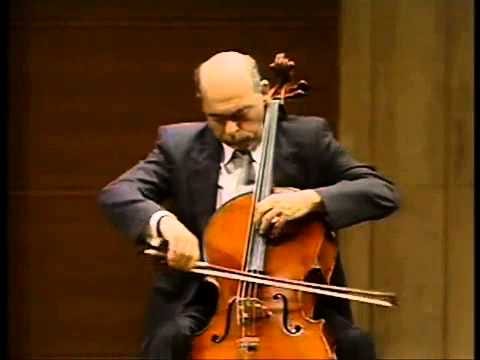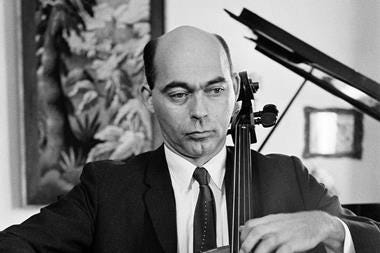‘I prefer to play music, not to make music’
ARCHIVE On what would have been the 100th birthday of the legendary cellist János Starker, I revisit the interviews he gave me – and some of his very frank opinions
I consider myself the luckiest classical music journalist in the world to have had the privilege of interviewing some of the greatest string players in the world over the last 20 years, many of them my own personal heroes.
My memories and cassette recordings become even more valuable once these people are no longer with us. Interviews are an important way of passing on their thoughts, and wisdom accrued. We have CD recordings by these players as artistic testimonies, of course, but how did they get to that point? What did they learn that they could pass on? How might their perspective on history help us, generations later, and somehow influence a healthy evolution of classical music? Video interviews are wonderful, if people actually watch them and remember the points, but I believe there is still great value in having these words written down – one of the main points of this Substack, really. [Enough subliminal advertising! Ed.]
I only met János Starker once, on a trip to Indiana University Jacobs School of Music in 2010 when I was Editor of The Strad. He was teaching in his studio, mixing a twinkly charm with cutting criticism of his students and plenty of jokes (including a Yo-Yo Ma imitation), smoking all the while. I subsequently interviewed him over the phone a couple of times, including for The Strad’s Cello Heroes supplement. He wasn’t having any of that title, though…
Don’t idolise anybody
‘I don’t like the word ‘idol’ because it has connotations of religion and of teenagers and rock stars. I admire people and appreciate people, but I don’t idolise anybody. I believe in taking some people as examples of what they do. The problem with having idols is that it requires total acceptance of everything they do. Students often listen to my recordings, but if they start copying me, I get angry. The most important aspect of my educational activities is that students are not only supposed to learn a certain work that is written for the cello, they’re also supposed to listen to the output of the composer so they can understand the language of the composer. So don’t only listen to a Beethoven cello sonata but listen to his chamber music and concertos and symphonies in order to understand what he means and how he spoke.’
Casals, Feuermann and Heifetz, and their recognisable sounds
‘Pablo Casals was the one who put the cello on the map as a solo instrument. Before, cellists played here and there on occasion but cello recitals were unknown. Because of him a number of people wrote important works for the literature. I heard Casals when I was a little over six years old. My teacher was a friend of his and he planted a little kiss on my face and supposedly I didn’t wash for a week. Later I heard him many times in concert in Budapest and after the war in London.
‘Then came Emanuel Feuermann, who superseded Casals as an instrumentalist - but not as a musician or artist. I wasn’t particularly impressed by Feuermann’s sound - Casals’s sound is the beautiful one that even today people associate with the cello. Feuermann was incredibly manually gifted and had good ears. He was the one who played most in tune, as we expect in today’s cello playing. I heard Feuermann when I was eleven when he played a recital with Bartók. I never met him except after a concert when I got his autograph.
‘Feuermann approached the level of Jascha Heifetz, who was the person I admired most in the instrumental world. For me, he established the instrumental standards of the 20th century. These players were the ones who succeeded at that time in intonation: what we do to create lyric intonation, what I call ‘tendency intonation’, where intonation is always adjusted to the harmonic structure. Casals said that when he was in Barcelona it wasn’t expected for people to play in tune and together. Most people played out of tune and were scratching.
‘Only Casals and Feuermann had what we call a recognisable sound - they are players who when you turn on the radio you know who they are. Today there are many outstandingly gifted people but they are not recognisable and that’s the core issue of judging instrumentalists.’
The intensity of Jacqueline du Pré
‘The first time I heard Jacqueline du Pré was on the radio in a car, playing the Elgar Cello Concerto. I said to the driver, Whoever this person is will not live very long. I made this statement somewhere and all her friends got mad at me, but it was factual - someone who exerts that sort of intensity consistently will destroy their nervous system. I was saddened when she was struck with MS. She was an outstandingly effective and dedicated performer, but whoever has that sort of intensity cannot last for long.
‘Exerting unbroken intensity can be very appealing to the public, and obviously it was, as she was successful, but in my mind, you’re supposed to play music - you’re not supposed to work. You have to approach instrumental playing with all the power that’s available but use as little as is necessary. My example was Heifetz.’
Learning from singers
‘Sound-wise, I learnt from singers, and above all it was Jussi Björling who had the most beautiful pure sound production and the most tasteful with presentation, even in cheapened Italian arias. My approach has always been to use as little energy as is needed to get the message across through a masterpiece. I prefer to play music, not to make music. My ambition is to find in English the equivalent of ‘suonare’ in Italian, or ‘musizieren’ in German.’
On the ‘American sound’
‘There is no American sound. It is a British invention for those who play accurately and with discipline. When I was admired I was called the Hungarian virtuoso. When I was panned I was the American virtuoso. All those so-called American sounds came from Russians, Poles, Jews and such. The English used to say that Heifetz had the American sound, but what kind of American was Heifetz? There are those with recognisable sounds as individuals, although today most players sound the same – but nationality plays no part in it.’
Read my Strad interview with Gary Hoffman about learning with Starker





Such valuable insights here, and I love his no-nonsense style! Thank you for sharing Ariane.